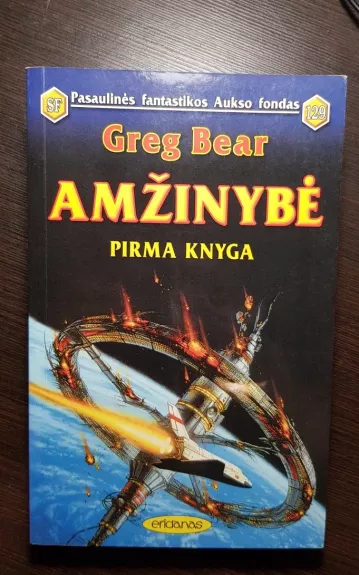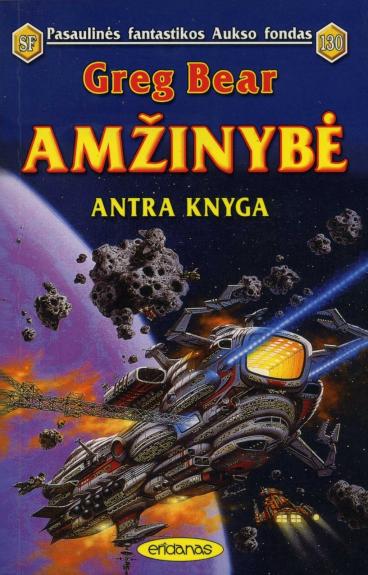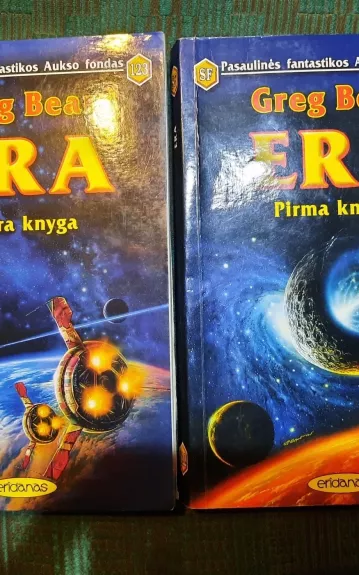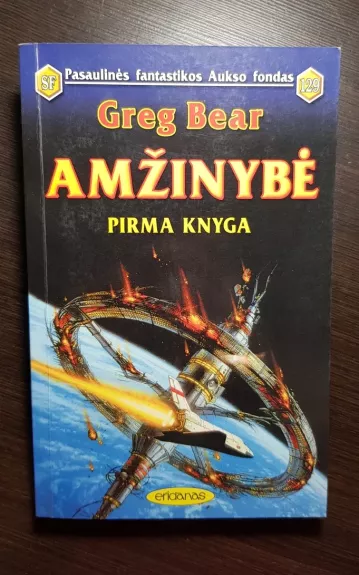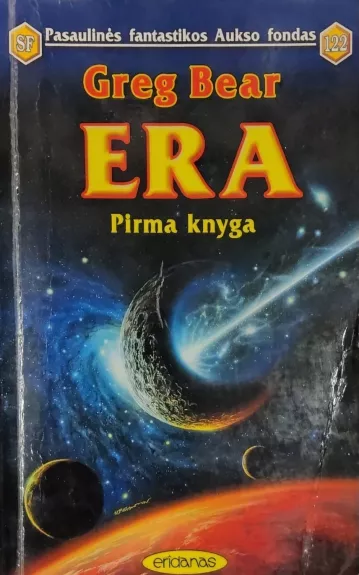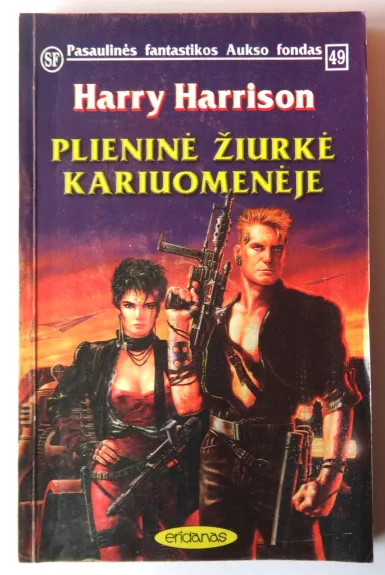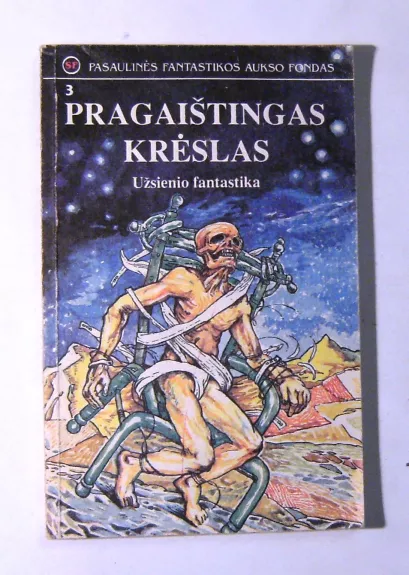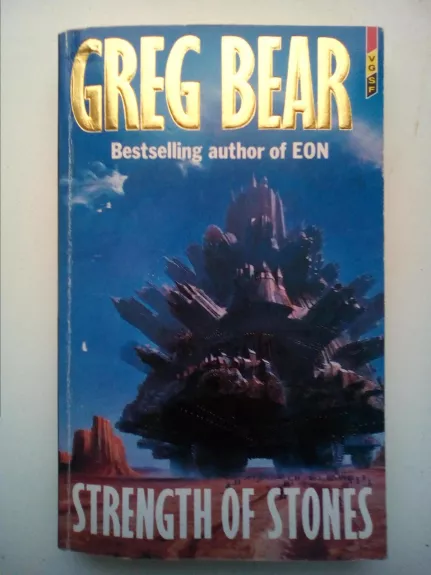
Strength of stones
The novel is set in a far future where cities are completely automated including the ability to move themselves. At some point in the past the cities decided that humans were not required, or wanted, and banished them leaving the population to live in the wilderness. Humans see the cities as a kind of Eden, a paradise that they have been banished from. Over time, some people have chosen to reject their banishment and have attempted to plunder the cities. The cities themselves also appear to be failing, perhaps because they lack an enduring purpose with no population to protect. One city has uniquely allowed a human to live inside it.
=======================================================
Gregory Dale Bear (August 20, 1951 – November 19, 2022) was an American writer and illustrator best known for science fiction.[4] His work covered themes of galactic conflict (Forge of God books), parallel universes (The Way series), consciousness and cultural practices (Queen of Angels), and accelerated evolution (Blood Music, Darwin's Radio, and Darwin's Children). His last work was the 2021 novel The Unfinished Land. Greg Bear wrote over 50 books in total.[5]
Early life
Greg Bear was born in San Diego, California. He attended San Diego State University (1968–1973), where he received a Bachelor of Arts degree. At the university, he was a teaching assistant to Elizabeth Chater in her course on science fiction writing, and in later years her friend.[citation needed]
Career
Bear is often classified as a hard science fiction author because of the level of scientific detail in his work.[5] Early in his career, he also published work as an artist, including illustrations for an early version of the reference book Star Trek Concordance and covers for periodicals Galaxy and F&SF.[6] He sold his first story, "Destroyers", to Famous Science Fiction in 1967.[6]
In his fiction, Bear often addresses major questions in contemporary science and culture and proposes solutions. For example, The Forge of God offers an explanation for the Fermi paradox, supposing that the galaxy is filled with potentially predatory intelligences and that young civilizations that survive are those that do not attract their attention but stay quiet. In Queen of Angels, Bear examines crime, guilt, and punishment in society. He frames these questions around an examination of consciousness and awareness, including the emergent self-awareness of highly advanced computers in communication with humans. In Darwin's Radio and Darwin's Children, he addresses the problem of overpopulation with a mutation in the human genome making, basically, a new series of humans. The question of cultural acceptance of something new and unavoidable is also indicated.
One of Bear's favorite themes is reality as a function of observation. In Blood Music, reality becomes unstable as the number of observers (trillions of intelligent single-cell organisms) spirals higher and higher. Anvil of Stars (sequel to The Forge of God) and Moving Mars postulate a physics based on information exchange between particles, capable of being altered at the "bit level."[a] In Moving Mars, that knowledge is used to remove Mars from the Solar System and transfer it to an orbit around a distant star.
Blood Music was first published as a short story (1983) and then expanded to a novel (1985). It has also been credited as the first account of nanotechnology in science fiction.[citation needed] More certainly, the short story is the first in science fiction to describe microscopic medical machines and to treat DNA as a computational system capable of being reprogrammed, that is, expanded and modified. In later works, beginning with Queen of Angels and continuing with its sequel, Slant, Bear gives a detailed description of a near-future nanotechnological society. This historical sequence continues with Heads—which may contain the first description of a so-called "quantum logic computer"—and with Moving Mars. The sequence also charts the historical development of self-awareness in artificial intelligence. Its continuing character Jill was inspired in part by Robert A. Heinlein's self-aware computer Mycroft HOLMES in The Moon Is a Harsh Mistress (1966).
Bear, Gregory Benford, and David Brin wrote a trilogy of prequel novels to Isaac Asimov's influential Foundation trilogy. Bear is credited with the middle book.
While most of Bear's work is science fiction, he has written in other fiction genres. Examples include Songs of Earth and Power (fantasy) and Psychlone (horror). Bear has described his Dead Lines, which straddles the line between science fiction and fantasy, as a "high-tech ghost story".[7] He has received many accolades, including five Nebula Awards and two Hugo Awards.[8]
Bear cited Ray Bradbury as the most influential writer in his life. He met Bradbury in 1967 and had a lifelong correspondence. As a teenager, Bear attended Bradbury lectures and events in Southern California.[9]
He also served on the Board of Advisors for the Museum of Science Fiction.[10] Bear was also one of the five co-founders of the San Diego Comic-Con.[11]
Personal life and death
In 1975, Bear married Christina M. Nielson; they divorced in 1981. In 1983, he married Astrid Anderson, the daughter of the science fiction and fantasy authors Poul and Karen Anderson. They had two children, Chloe and Alexandra, and resided near Seattle, Washington.[12]
Bear died on November 19, 2022, at the age of 71, from multiple strokes, caused by clots that had been hiding in a false lumen of the anterior artery to the brain since a surgery in 2014.[13] After being on life support for two days and not expected to recover, per his advance healthcare directive, life support was withdrawn.[14][15]
Awards and accolades
The story on which the novel Blood Music was based, published in the June 1983 issue of Analog, won the Best Novelette Nebula Award (1983)[16] and Hugo Award (1984).[17]
"Tangents" won both the Hugo Award for Best Short Story[18] and the Nebula Award for Best Short Story[19]
Darwin's Radio won the Endeavour Award in 2000.
Hull Zero Three was short-listed for the Arthur C. Clarke (Book) Award in 2012.
Hayakawa Award "Heads" Best Foreign Short Story (1996).
Inkpot Award (1984)[20]
Doris Lessing, winner of the 2007 Nobel Prize in literature, wrote, "I also admire the classic sort of science fiction, like Blood Music, by Greg Bear. He's a great writer."[21]
The 2024 novel Halo: Epitaph, a continuation of Bear's Forerunner Saga, was dedicated to Bear's memory by author Kelly Gay.
Bibliography
Novels
Series
Darwin
Darwin's Radio (1999) Nebula Award winner, Hugo, Locus SF, and John W. Campbell Memorial Awards nominee, 2000[22]
Darwin's Children (2003) Locus SF, Arthur C. Clarke, and John W. Campbell Memorial Awards nominee, 2004[23]
The Forge of God
The Forge of God (1987) Hugo, and Locus SF Awards nominee, 1988;[24] Nebula Award nominee, 1986[25]
Anvil of Stars (1992)
Songs of Earth and Power
The Infinity Concerto (1984) Locus Fantasy Award nominee, 1985[26]
The Serpent Mage (1986)
Songs of Earth and Power (1994 – combines The Infinity Concerto and The Serpent Mage)
Quantico
Quantico (2005)
Mariposa (2009)
Quantum Logic
Novels in internal chronology:[27]
Queen of Angels (1990) Hugo, Locus, and John W. Campbell Memorial Awards nominee, 1991[28]
Slant (1997) John W. Campbell Memorial Award nominee, 1998[29]
Heads (1990)
Moving Mars (1993) Nebula Award winner; Hugo, Locus SF, and John W. Campbell Memorial Awards nominee, 1994[30]
War dogs
War dogs. Orbit. 2014.
Killing Titan (2015)
Take Back the Sky (2016)
The Way
Eon (1985) Arthur C. Clarke Award nominee, 1987[31]
Eternity (1988)
Legacy (1995) Locus SF Award nominee, 1996[32]
The Way of All Ghosts (1999)
Series (non-originating author)
The Foundation Series
Foundation and Chaos (1998) (Second Foundation series: book 2)
Man-Kzin Wars
The Man Who Would Be Kzin (with S.M. Stirling) (1991)
Halo
Forerunner Saga (trilogy)
Halo: Cryptum (2011)
Halo: Primordium (2012)
Halo: Silentium (2013)[33]
Star Trek: The Original Series
Corona (1984)
Star Wars
Rogue Planet (2000)
Foreworld Saga
The Mongoliad (2012–2013[34])
Non-series
Hegira (1979)
Psychlone (1979)
Beyond Heaven's River (1980)
Strength of Stones (1981)
Blood Music (1985) Hugo, and John W. Campbell Memorial Awards nominee, 1986;[25] British Science Fiction Award nominee, 1986;[25] Nebula Award nominee, 1985[26]
Dinosaur Summer (1998) (winner 1999 Endeavour Award)
Vitals (2002) John W. Campbell Memorial Award nominee 2003[35]
Dead Lines (2004)
City at the End of Time (Gollancz edition published July 17, 2008;[36] Del Rey Books edition August 2008[37]) (Nominated for the Locus and Campbell Awards, 2009[38])
Hull Zero Three (2010)
The Unfinished Land (2021)
Short fiction
Hardfought (1983)
Collections
The Wind from a Burning Woman (1983, vt The Venging 1992)
Early Harvest (February 1988)
Tangents (1989)
Bear's Fantasies (1992)
The Collected Stories of Greg Bear (2002)
W3: Women in Deep Time (2003)
Sleepside: The Collected Fantasies (November 2005)
Anthologies edited
New Legends (1995, with Martin H. Greenberg)
Multiverse: Exploring Poul Anderson's Worlds (2014, with Gardner Dozois)
Nebula Awards Showcase 2015 (2015)[39]
Critical studies and reviews of Bear's work
War dogs
Sakers, Don (May 2015). "The Reference Library". Analog Science Fiction and Fact. Vol. 135, no. 5. pp. 104–107.




